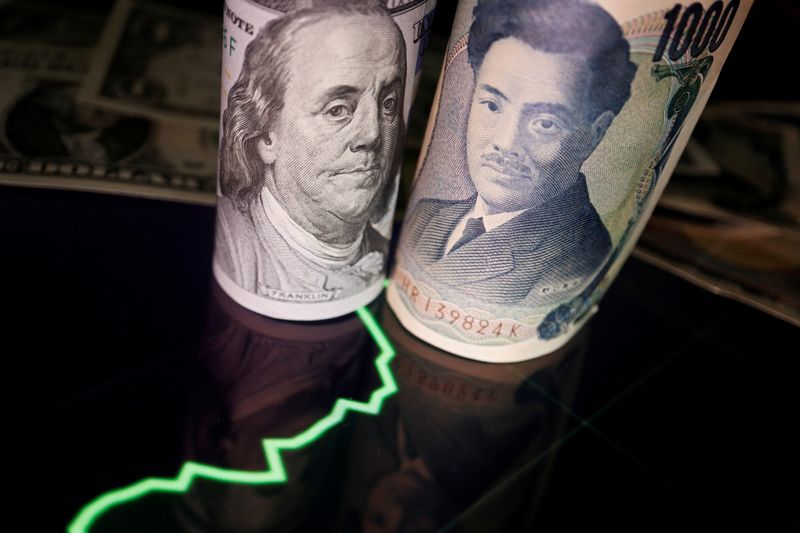By Gertrude Chavez-Dreyfuss
NEW YORK (Reuters) – The dollar gained against the yen on Thursday, climbing in nine of the last 10 sessions, after Federal Reserve Chair Jerome Powell reiterated that the U.S. central bank will continue to raise interest rates in order to tame surging inflation and warned against prematurely loosening monetary policy.
For the last several months, dollar-yen has been the currency pair most sensitive to U.S. rate expectations.
Across the Atlantic, the European Central Bank raised interest rates by a record 75 basis points (bps), taking the deposit rate above 0% for the first time since 2012. The euro initially went above parity against the dollar, but has since weakened amid Powell’s comments.
Fed officials are soon due to enter a blackout period prior to the central bank’s Sept. 20-21 meeting.
In remarks at a Cato Institute conference, Powell said the Fed needs to keep going until it gets the job done and is “strongly committed” to bringing inflation down. [nL1N30F29H]
“I am not convinced that the dollar’s highs are in place yet,” said Marc Chandler, chief market strategist, at Bannockburn Global Forex in New York.
“Powell did not add anything new to what he said in Jackson Hole or to what (Fed Vice Chair Lael) Brainard said yesterday but I expect the dollar to consolidate ahead of CPI (consumer price index) next week,” he added.
U.S. rate futures have priced in an 87% chance the Fed will hike by another 75 bps at this month’s meeting, which would increase the Fed funds rate to 3.0% to 3.25%.
The Fed “could very well do” a 75-bps increase at its September meeting, said Chicago Fed President Charles Evans on Thursday, who has tended to be on the dovish side of monetary policy debates.
Barclays (LON:BARC), in its latest research note, said it is also forecasting a 75-bps hike this month, noting it sees an outside chance that a softer-than-expected August CPI number will swing the pendulum back toward 50 bps.
In afternoon trading, the dollar rose 0.1% to 143.96 yen . On Tuesday, it surged to a 24-year peak of 144.99 yen.
The dollar index was flat at 109.63, after soaring to its strongest level since June 2002 the day before.
The euro, on the other hand, dropped 0.1% to $0.9994 .
The ECB said it expected to continue raising rates to dampen demand, prioritizing the fight against inflation.
“We have more journey to cover going forward,” ECB President Christine Lagarde told a news conference, adding that there had been unanimous agreement about the need for a 75-basis point hike to “frontload” the move toward rates.
The yen, on the other hand, has been a particular victim of recent dollar strength, as the Bank of Japan remains the lone dovish central bank.
Japan is ready to take action in the currency market and will not rule out any options to address “clearly excessive volatility” seen in recent yen moves, the country’s top currency diplomat said after a meeting between the Bank of Japan, Ministry of Finance and Financial Services Agency.
Traders are on the lookout for Japan intervention to boost the yen.
Bannockburn’s Chandler believes though that Japan will unlikely intervene in the market.
“Japan knows the U.S. is not favor of intervention,” said Chandler. “Even though (U.S. Treasury Secretary Janet) Yellen doesn’t talk about it much, the strong dollar policy is alive and well at the Fed. The strong dollar is part of the tightening of financial conditions.”
In other currencies, sterling fell against the dollar after Queen Elizabeth, Britain’s longest-reigning monarch and the nation’s figurehead for seven decades, died. [GBP/]



